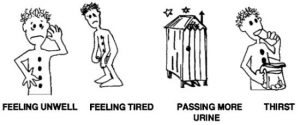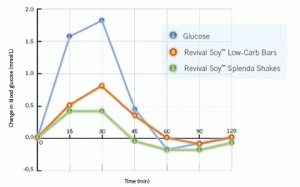What are Type 2 diabetes symptoms?

What are Type 2 diabetes symptoms? Type 2 diabetes symptoms are much like type 1 symptoms. The difference between type 1 and 2 is that people who have type 2 diabetes must inject insulin in order to maintain a safe blood sugar. Diabetes is a very serious condition where the pancreas stops or slows in the production of a serious hormone called insulin. (in type 2 it stops) Insulin is a hormone that the body uses to change sugar in the bloodstream into fuel that the body’s cells can use. When too little of the hormone is present the blood sugar levels begin to rise to dangerous levels. When they reach a certain level they begin to damage the body in serious ways. The damage that is commonly done includes heart damage, eye damage, nerve damage, and kidney damage. This makes knowing what Type 2 diabetes symptoms are a need.
So what are type 2 diabetes symptoms? (Type 1 and 2 symptoms are basically the same) The main and major type 2 diabetes symptoms are fatigue, weight loss, hunger, thirst, extreme urination. Fatigue and weight loss are both caused by the body not getting enough fuel. So they consume fat, or become tired. Hunger is the symptom of your cells becoming low on energy. Thus they send ‘’hungry’’ signals to the brain. Extreme urination is caused by the body trying to clean itself of the excess blood sugar. This in turn causes extreme thirst as the body needs to replace the lost water. These symptoms should be noticed immediately and reported to your doctor. Diabetes can do damage to you but the faster you notice the type 2 diabetes symptoms, the more healthy you stay. So talk to your doctor about type 2 diabetes.





